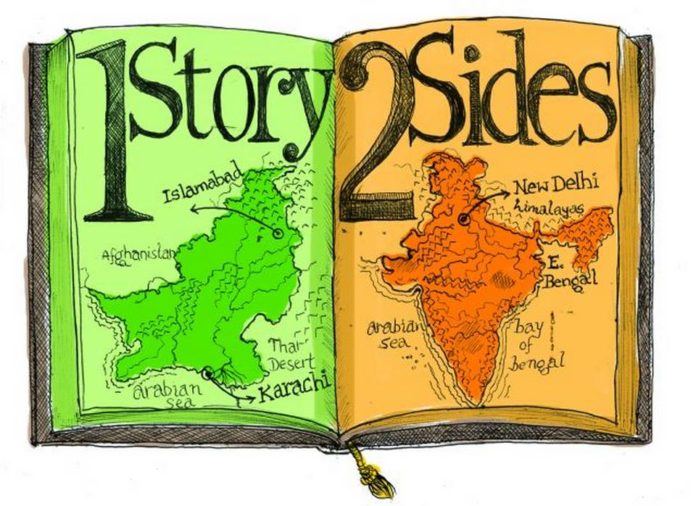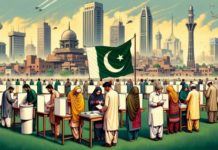Since independence we have been telling the nation that Kashmir is part of unfinished agenda of the partition plan and Pakistan is incomplete without it. Kashmir issue is thus imbedded in our psyche and we cannot afford a major shift in our declared stance. We have moral and religious obligations towards the Muslim majority in Kashmir. Covert as well as overt support to the Kashmir’s is a compulsion for Pakistan. Pakistan’s principled stance has been that Kashmir is a disputed territory and the issue should be resolved based on UN resolutions through an impartial plebiscite.
However recently while showing flexibility, Pakistan has offered certain solutions proposals in a bid to break the status quo over Kashmir. Pakistan’s principled stand on the Kashmir Issue since 1948 represents the aspirations of the nation. Any major shift in Pakistan’s policy stance at this stage would generate serious public reaction, unless the masses are educated and taken into confidence. With the passage of time and changed geo-strategic environment, Kashmir Issue is now being viewed as a territorial dispute between India and Pakistan and its relevance as a humanitarian and moral issue has diminished.
Consequently, the interest of the world towards early resolution of the dispute has waned and no one seems ready to act as an arbitrator. Due to unresolved Kashmir Issue, acrimony persists between India and Pakistan having serious effects on the economies of both the countries. To foster prosperity for our people, early resolution of issue is, however, an imperative. As an outcome of the indigenous freedom movement, Kashmir’s have emerged as the Third party in the dispute which implies that options other than Kashmir’s accession to either India or Pakistan can also become a reality.
Currently Pakistan is passing through a very delicate stage of its history. Economic degradation and prolonged international isolation have affected the defense potential of the country adversely. Slogans alone will not solve the Kashmir issue unless moral and diplomatic efforts are backed up by a potent military instrument and economic wherewithal.
India since the mid-fifties has refused to recognize the validity of UN resolutions of Kashmir As a matter of policy she considers Kashmir to be a resolved issue and its accession to India at the time of partition as a rightful act of the Maharaja. Above notwithstanding, Pakistan refutes Indian claims and bases its case on the UN resolutions which do not support the accession of Kashmir to India and recognize the right of self determination for the people of Kashmir. India Revokes Occupied Kashmir’s Special Status
Over the years on several occasions, Pakistan tried to resolve the issue through diplomatic means, however the resultant bilateral talks failed due to the rigid stance of the Indian side, insisting that Kashmir is a non-issue. The rapidly changing environment after nuclear explosions in 98 by both the countries has once again brought the Kashmir issue into sharp focus after remaining dormant for decades. Recognizing the need for permanent solution, several possible options are mentioned as follows.
Plebiscite Under the UN Resolutions.
This is the only option which enjoys UN approval and on which both India and Pakistan, had at one stage agreed. However, India currently perceives a sure defeat in such an arrangement which would be too humiliating for her; also the fear of accentuating centrifugal forces in other regions and a backlash against Muslims in other parts of India are linked with this option.
Division Based on Partition Plan.
To divide Kashmir on the principles of partition of the sub-continent i.e. annexation of Muslim majority areas to Pakistan and Hindu dominated area to India, while Buddhists of Ladakh area be given a choice to join either country. In practical terms it would mean, accession of Northern Areas, Azad Kashmir, Valley and Muslim majority areas of Jammu and Ladakh with Pakistan and remaining areas with India. This proposal is generally similar to the long standing proposal of Sir Down Dixon, which envisages division of Jammu & Kashmir for plebiscite into Valley, Jammu, Ladakh, Azad Kashmir including Northern Areas, to enable the people of these four regions to separately decide on accession to either Pakistan or India.
Independent Kashmir.
It envisages an independent and sovereign state comprising of all the parts of Jammu & Kashmir (including Northern Areas and Ladakh). This option is very vigorously being propagated by Jammu Kashmir Liberation Front (JKLF) and has also found favour with some Western countries. The proponents of this option argue that the Kashmir problem concerns the fate of twelve million people; therefore they should have the option to join Pakistan/India or become independent. Some Pakistani intellectuals also support this option on the ground that if Kashmir could get out of Indian clutches it should be acceptable to Pakistan. It is argued that, independent Kashmir, because of common religion, culture, geographical contiguity and enhanced economic ties would be friendly with Pakistan. This option impinges on the strategic interests of both India and Pakistan and may, therefore, not be acceptable. However, the option can be made plausible by leaving Northern Areas with Pakistan and Jammu and Ladakh with India.
An independent “Kashmir Valley ” has also been considered by some as the best solution because it would address the grievances of those who have been fighting against the Indian Government since the insurgency began in 1989. But critics say that, without external assistance, the region would not be economically viable. In the present day, if a regional plebiscite offered independence as an option, it is possible that the majority of Kashmir’s would vote in favor of independence. An independent Kashmir Valley would have the advantage of giving neither Pakistan nor India a victory out of their longstanding dispute. But although Pakistan might favor the creation of an independent Kashmir Valley, India would be unlikely to agree to the loss of territory involved.








